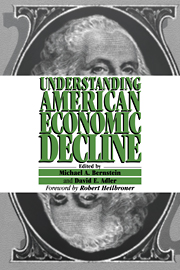Foreword: Writing about the economic future
Published online by Cambridge University Press: 05 June 2012
Summary
It has always been the ambition of economics to anticipate the future. I do not mean that the discipline has ever pretended to an ability to make hard-and-fast predictions – along with the rest of social inquiry, economics had a hard enough time explaining the past. I am speaking of another kind of ambition that differs from true prediction in that its arguments rarely concern specific events, much less explicit timetables. This aspect of economics can be described as historical vision, with the odd twist that the word “historical” refers to the future rather than the past. That is why I have used the deliberately imprecise term “anticipate” to describe the unique ambition of economics, whose increasing unreliability constitutes an important underlying premise of this book.
Writing about the ideas of the great economists many years ago, I called their future-oriented visions “scenarios.” The word was intended to emphasize the drama-laden character of their exercises in social analysis, in which a few simple assumptions about human and physical nature formed the basis for complicated narratives involving the rise and fall of social classes and the viability of entire social orders. Marx is, of course, the textbook case in point, but the description applies as well to Adam Smith and John Stuart Mill, John Maynard Keynes and Joseph Schumpeter. By way of contrast, no such single large-scale historical vision is present in these essays.
- Type
- Chapter
- Information
- Understanding American Economic Decline , pp. ix - xiiPublisher: Cambridge University PressPrint publication year: 1994

